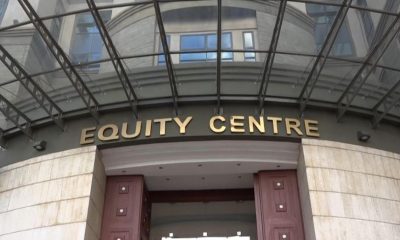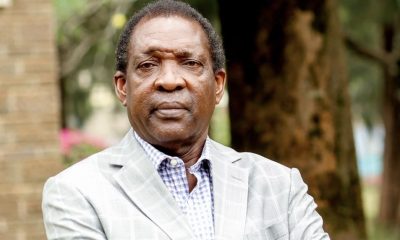The long-awaited tea reforms in the tea industry have started taking shape with the government outlining the various regulatory and administrative reforms it intends to undertake in the sector. They include the audit and tracing of deductions of money belong to smallholder tea growers over the last 10 years, evaluation of the management of the KTDA holding and reserve accounts, evaluate and document losses occasioned by the pooled management of farmers’ earning by KTDA including cash held banks and monies held and/or lost to banks in distress, assess the application and use of public and farmers assets by KTDA.
Peter Munya the Cabinet Secretary Ministry of Agriculture, Livestock, Fisheries and Cooperatives outlined the proposed reforms when he launched the revised draft of tea regulations. The CS says the regulations are submitted for public consultations for a period of fourteen (14) days from today. The regulations shall be available on the websites of both the Ministry of Agriculture, Livestock, Fisheries and Cooperatives and the Agriculture and Food Authority (AFA). A hotline has also been provided at AFA for purposes of providing any clarifications. The Ministry shall only be receiving written Memorandums from members of the public due to inability to hold any public gatherings in the wake of Ministry of Health guidelines on social distancing among other measures in the management of COVID-19 pandemic.
Munya says the good performance of the tea sector is a central public policy issue because approximately 70% of tea production in the country is undertaken by small scale tea farmers. The challenges facing the tea sector, if not addressed he says have the potential to recreate the problems faced by the coffee sector over two decades ago that led to neglect and/or abandonment of coffee bushes by farmers and the prevailing low coffee production in the country. He adds that the real threats to smallholder tea farming and the macro-economy have therefore created an urgent need for proportionate Government intervention in the sector in the manner more particularly advocated in the Presidential Directive issued on 14th January 2020 to overhaul the sector.
During the launch, CS Munya identified the problems that need to be addressed in the sector some which he says need urgent intervention once the regulations come into effect. “The Government has therefore contextualized the challenges facing the tea sector and more particularly the tea farmers into three broad categories namely a dysfunctional tea auction system; control and predatory behaviour of Kenya Tea Development Authority (KTDA) and its subsidiaries in the tea value chain; and low and unstable tea prices,” says Munya. “Moreover, the tea sector is undermined by the manipulation and predatory behaviour of KTDA and its subsidiaries on the value chain. KTDA which supplies over 60% of the tea traded at the auction has consistently used its market power, dominance and influence to undermine the auction, curtail price discovery and exploit the vulnerabilities of smallholder tea growers,” he adds.
On the tea auction, Munya says it is “a dysfunctional and inefficient tea auction system characterized by lack of transparency, accountability and competition; and prone to manipulation, capture, insider trading and cartelization by value chain players leading to ineffective price discovery, low prices and poor earnings to tea farmers. The structural character of the tea auction in Mombasa in terms management, governance and decision making processes is that it is a club where all value chain players, that have a direct commercial interest in the outcome of the auction process run the auction. This is a serious conflict of interest that predisposes the auction process to capture by vested interests, insider trading, price-fixing and other malpractices.
On the issue of prices, the CS says tea farmers have been plagued by a twin problem of low prices and price volatility. He says while the low prices have eroded direct earnings by tea growers, tea price volatility has led to unstable cash flow for tea farmers.
Regulatory Interventions
To address these challenges, Munya says the following regulatory remedies have been proposed for implementation immediately these regulations come into effect:
- All teas produced in Kenya for the export market in shall within two (2) months after coming into effect of these regulations be sold exclusively through the auction process.
- Henceforth, sale by private treaty commonly known as Direct Sales Overseas is outlawed
- Any teas that are not sold during a particular auction shall be re-listed for sale during the subsequent auction;
- All registered tea auction organizers shall establish an electronic trading platform for tea auction. However, a tea auction organizer existing before the commencement of these regulations shall establish and migrate tea trading to an electronic trading platform within two (2) months from the commencement date of the regulations;
- All tea buyers shall henceforth submit to the Regulatory Authority (AFA) a performance bond in the form of a bank guarantee equivalent to 10% of the estimated value of the tea they intend to buy to underwrite commercial risks associated with buyers who fail and/or refuse to pay in full for the tea bids they win at the auction;
- All buyers shall pay in full for all teas they win at the auction before they take custody and lift the tea for export
- All factory Limited Companies (Tea Factories) shall henceforth register and enlist with the Authority and auction organizer to participate at the tea auction directly;
- A registered tea broker shall offer brokerage services to a maximum of fifteen (15) factory limited companies. Brokers that are already in operation shall continue with their business uninterrupted until the tenure of their registration is due for renewal;
- All monies from the sale of tea at the auction shall be remitted directly to Factory Limited Accounts within fourteen (14) days from the auction date less only the agreed commission for tea brokers;
- Factory Limited Companies shall within thirty (30) days from receipt of proceeds from sale of tea pay tea growers at least 50% of the payment for green leaf delivered every month;
- The balance due to tea growers shall be paid by the factory limited companies within the financial or calendar year as shall be agreed with the growers
In order to address the challenges associated with the lopsided nature of the existing management agreement framework with Factory Limited Companies, the following regulatory interventions are proposed:
- Any management agency agreement with a factory limited company shall be for a tenure not exceeding 5 years;
- The remuneration for any management service shall not exceed two per cent 2% of the value of tea sold per year;
- Company secretary services shall be excluded from the services offered by management service providers;
- Factory Limited Companies shall either recruit in-house company secretaries or outsource the service
- A director or affiliate of a management service provider shall not serve as a director or have a direct commercial relationship with a factory limited company they serve
Short to Medium Term Policy and Administrative Interventions
To address other systemic challenges facing the tea sector, the Government proposes to engage professional consultants with the necessary experience in the tea industry to provide technical advice on further necessary policy and administrative reforms to improve efficiency and productivity in the value chain. In particular, the following interventions are proposed in this respect:
- Undertake a technical study to define a clear migration path and governance framework from the current tea auction structure to an efficient, competitive and responsive Commodities Exchange for tea. In particular, the study will provide technical advice on the governance framework to deal the inherent weakness of the current auction system that includes predisposition to conflict of interest, capture by vested interests, insider trading, dominance in the auction market and ineffective price discovery system.
- Undertake a study to evaluate the impact of KTDA commercial behaviour on the entire value including and more particularly the earnings to smallholder tea growers. In particular, the study would undertake a historic audit and tracing of deductions of money belong to smallholder tea growers over the last 10 years, evaluate the management of the KTDA holding and reserve accounts, evaluate and document losses occasioned by the pooled management of farmers’ earning by KTDA including cash held banks and monies held and/or lost to banks in distress, assess the application and use of public and farmers assets by KTDA, evaluate the risks associated with the sale of tea by private treaty by KTDA and losses that farmers have incurred due to this arrangement; evaluate the extent of application of farmers’ resources in the initial and on-going capitalization of KTDA subsidiaries and value of these subsidiaries to the tea growers among other considerations.
- Undertake a study on the setup, resourcing and management of a price stabilization fund for tea growers and develop a framework for implementation of a sustainable Minimum Guaranteed Return (MGR) for tea farmers; and
- Establishment of a steering committee to oversee, monitor and evaluate implement these policy, regulatory and administrative reforms and report to the cabinet secretary.
This article originally appeared on kilimo
Kenya Insights allows guest blogging, if you want to be published on Kenya’s most authoritative and accurate blog, have an expose, news TIPS, story angles, human interest stories, drop us an email on [email protected] or via Telegram

 Business5 days ago
Business5 days ago
 Business5 days ago
Business5 days ago
 Business2 weeks ago
Business2 weeks ago
 News2 weeks ago
News2 weeks ago
 Politics1 week ago
Politics1 week ago
 News2 days ago
News2 days ago
 Investigations4 days ago
Investigations4 days ago
 Business2 weeks ago
Business2 weeks ago

















